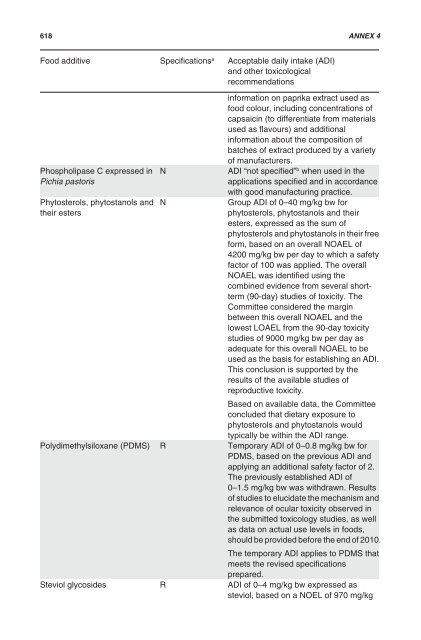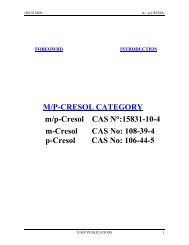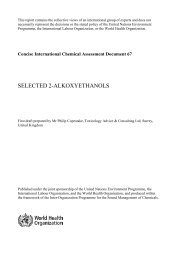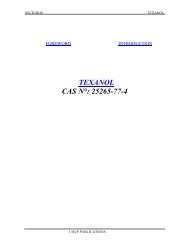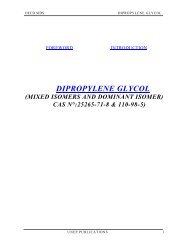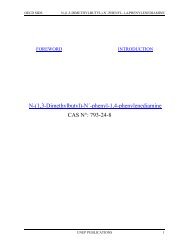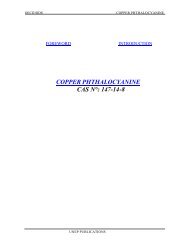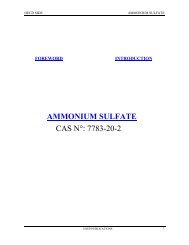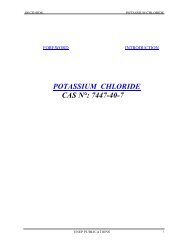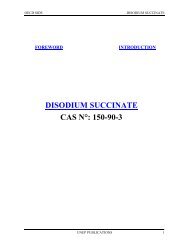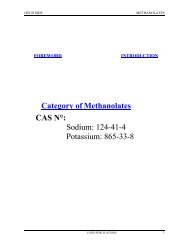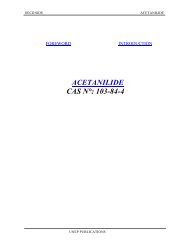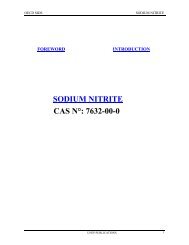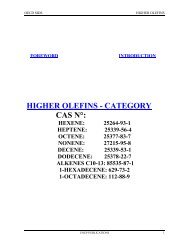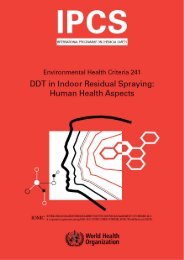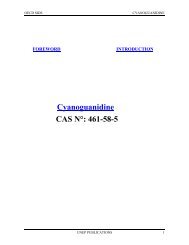- Page 2 and 3:
WHO FOOD ADDITIVES SERIES: 60 Safet
- Page 4 and 5:
CONTENTS Preface ..................
- Page 6:
PREFACE The monographs contained in
- Page 10 and 11:
ASPARAGINASE FROM ASPERGILLUS NIGER
- Page 12 and 13:
ASPARAGINASE FROM ASPERGILLUS NIGER
- Page 14 and 15:
ASPARAGINASE FROM ASPERGILLUS NIGER
- Page 16 and 17:
ASPARAGINASE FROM ASPERGILLUS NIGER
- Page 18 and 19:
ASPARAGINASE FROM ASPERGILLUS NIGER
- Page 20:
ASPARAGINASE FROM ASPERGILLUS NIGER
- Page 23 and 24:
16 CALCIUM LIGNOSULFONATE (40-65) 1
- Page 25 and 26:
18 CALCIUM LIGNOSULFONATE (40-65) ~
- Page 27 and 28:
20 CALCIUM LIGNOSULFONATE (40-65) A
- Page 29 and 30:
22 CALCIUM LIGNOSULFONATE (40-65) c
- Page 31 and 32:
24 CALCIUM LIGNOSULFONATE (40-65) T
- Page 33 and 34:
26 CALCIUM LIGNOSULFONATE (40-65) 2
- Page 35 and 36:
28 CALCIUM LIGNOSULFONATE (40-65) i
- Page 37 and 38:
30 CALCIUM LIGNOSULFONATE (40-65) T
- Page 39 and 40:
32 CALCIUM LIGNOSULFONATE (40-65) T
- Page 41 and 42:
34 CALCIUM LIGNOSULFONATE (40-65) T
- Page 43 and 44:
36 CALCIUM LIGNOSULFONATE (40-65) 6
- Page 46 and 47:
ETHYL LAUROYL ARGINATE First draft
- Page 48 and 49:
ETHYL LAUROYL ARGINATE 41 and Devel
- Page 50 and 51:
ETHYL LAUROYL ARGINATE 43 lauroyl a
- Page 52 and 53:
ETHYL LAUROYL ARGINATE 45 arginine.
- Page 54 and 55:
ETHYL LAUROYL ARGINATE 47 resulting
- Page 56 and 57:
ETHYL LAUROYL ARGINATE 49 Table 4.
- Page 58 and 59:
ETHYL LAUROYL ARGINATE 51 weight ch
- Page 60 and 61:
ETHYL LAUROYL ARGINATE 53 stomach l
- Page 62 and 63:
ETHYL LAUROYL ARGINATE 55 fibrosis
- Page 64 and 65:
ETHYL LAUROYL ARGINATE 57 Table 5 (
- Page 66 and 67:
ETHYL LAUROYL ARGINATE 59 first 4 d
- Page 68 and 69:
ETHYL LAUROYL ARGINATE 61 The gener
- Page 70 and 71:
ETHYL LAUROYL ARGINATE 63 treatment
- Page 72 and 73:
ETHYL LAUROYL ARGINATE 65 gestation
- Page 74 and 75:
ETHYL LAUROYL ARGINATE 67 Body weig
- Page 76 and 77:
ETHYL LAUROYL ARGINATE 69 Table 6.
- Page 78 and 79:
ETHYL LAUROYL ARGINATE 71 Table 7 (
- Page 80 and 81:
ETHYL LAUROYL ARGINATE 73 Table 7 (
- Page 82 and 83:
ETHYL LAUROYL ARGINATE 75 Table 7 (
- Page 84 and 85:
ETHYL LAUROYL ARGINATE 77 About 99%
- Page 86 and 87:
ETHYL LAUROYL ARGINATE 79 concentra
- Page 88 and 89:
ETHYL LAUROYL ARGINATE 81 theoretic
- Page 90 and 91:
ETHYL LAUROYL ARGINATE 83 Huntingdo
- Page 92 and 93:
PAPRIKA EXTRACT First draft prepare
- Page 94 and 95:
PAPRIKA EXTRACT 87 of capsanthin ra
- Page 96 and 97:
PAPRIKA EXTRACT 89 biochemical para
- Page 98 and 99:
PAPRIKA EXTRACT 91 Table 1. Sales o
- Page 100 and 101:
PAPRIKA EXTRACT 93 Table 2. Estimat
- Page 102 and 103:
PAPRIKA EXTRACT 95 The European Sci
- Page 104 and 105:
PAPRIKA EXTRACT 97 The potential di
- Page 106 and 107:
PAPRIKA EXTRACT 99 Hornero-Mendez,
- Page 108 and 109:
PAPRIKA EXTRACT 101 Appendix 1. Res
- Page 110 and 111:
PAPRIKA EXTRACT 103 Appendix 1. (co
- Page 112:
PAPRIKA EXTRACT 105 Appendix 1. (co
- Page 115 and 116:
108 PHOSPHOLIPASE C EXPRESSED IN PI
- Page 117 and 118:
110 PHOSPHOLIPASE C EXPRESSED IN PI
- Page 119 and 120:
112 PHOSPHOLIPASE C EXPRESSED IN PI
- Page 121 and 122:
114 PHOSPHOLIPASE C EXPRESSED IN PI
- Page 124 and 125:
PHYTOSTEROLS, PHYTOSTANOLS AND THEI
- Page 126 and 127:
PHYTOSTEROLS, PHYTOSTANOLS AND THEI
- Page 128 and 129:
PHYTOSTEROLS, PHYTOSTANOLS AND THEI
- Page 130 and 131:
PHYTOSTEROLS, PHYTOSTANOLS AND THEI
- Page 132 and 133:
PHYTOSTEROLS, PHYTOSTANOLS AND THEI
- Page 134 and 135:
PHYTOSTEROLS, PHYTOSTANOLS AND THEI
- Page 136 and 137:
PHYTOSTEROLS, PHYTOSTANOLS AND THEI
- Page 138 and 139:
PHYTOSTEROLS, PHYTOSTANOLS AND THEI
- Page 140 and 141:
PHYTOSTEROLS, PHYTOSTANOLS AND THEI
- Page 142 and 143:
PHYTOSTEROLS, PHYTOSTANOLS AND THEI
- Page 144 and 145:
PHYTOSTEROLS, PHYTOSTANOLS AND THEI
- Page 146 and 147:
PHYTOSTEROLS, PHYTOSTANOLS AND THEI
- Page 148 and 149:
PHYTOSTEROLS, PHYTOSTANOLS AND THEI
- Page 150 and 151:
PHYTOSTEROLS, PHYTOSTANOLS AND THEI
- Page 152 and 153:
PHYTOSTEROLS, PHYTOSTANOLS AND THEI
- Page 154 and 155:
PHYTOSTEROLS, PHYTOSTANOLS AND THEI
- Page 156 and 157:
PHYTOSTEROLS, PHYTOSTANOLS AND THEI
- Page 158 and 159:
PHYTOSTEROLS, PHYTOSTANOLS AND THEI
- Page 160 and 161:
PHYTOSTEROLS, PHYTOSTANOLS AND THEI
- Page 162 and 163:
PHYTOSTEROLS, PHYTOSTANOLS AND THEI
- Page 164 and 165:
PHYTOSTEROLS, PHYTOSTANOLS AND THEI
- Page 166 and 167:
PHYTOSTEROLS, PHYTOSTANOLS AND THEI
- Page 168 and 169:
PHYTOSTEROLS, PHYTOSTANOLS AND THEI
- Page 170:
PHYTOSTEROLS, PHYTOSTANOLS AND THEI
- Page 173 and 174:
166 POLYDIMETHYLSILOXANE (addendum)
- Page 175 and 176:
168 POLYDIMETHYLSILOXANE (addendum)
- Page 177 and 178:
170 POLYDIMETHYLSILOXANE (addendum)
- Page 179 and 180:
172 POLYDIMETHYLSILOXANE (addendum)
- Page 181 and 182:
174 POLYDIMETHYLSILOXANE (addendum)
- Page 183 and 184:
176 POLYDIMETHYLSILOXANE (addendum)
- Page 185 and 186:
178 POLYDIMETHYLSILOXANE (addendum)
- Page 187 and 188:
180 POLYDIMETHYLSILOXANE (addendum)
- Page 190 and 191:
STEVIOL GLYCOSIDES (addendum) First
- Page 192 and 193:
STEVIOL GLYCOSIDES (addendum) 185 r
- Page 194 and 195:
STEVIOL GLYCOSIDES (addendum) 187 c
- Page 196 and 197:
STEVIOL GLYCOSIDES (addendum) 189 a
- Page 198 and 199:
STEVIOL GLYCOSIDES (addendum) 191 N
- Page 200 and 201:
STEVIOL GLYCOSIDES (addendum) 193 2
- Page 202 and 203:
STEVIOL GLYCOSIDES (addendum) 195 T
- Page 204 and 205:
STEVIOL GLYCOSIDES (addendum) 197 a
- Page 206 and 207:
STEVIOL GLYCOSIDES (addendum) 199 r
- Page 208 and 209:
STEVIOL GLYCOSIDES (addendum) 201 l
- Page 210 and 211:
STEVIOL GLYCOSIDES (addendum) 203 g
- Page 212 and 213:
STEVIOL GLYCOSIDES (addendum) 205 T
- Page 214 and 215:
STEVIOL GLYCOSIDES (addendum) 207 T
- Page 216 and 217:
STEVIOL GLYCOSIDES (addendum) 209 t
- Page 218 and 219:
STEVIOL GLYCOSIDES (addendum) 211 t
- Page 220 and 221:
STEVIOL GLYCOSIDES (addendum) 213 s
- Page 222 and 223:
STEVIOL GLYCOSIDES (addendum) 215 C
- Page 224 and 225:
STEVIOL GLYCOSIDES (addendum) 217 L
- Page 226:
STEVIOL GLYCOSIDES (addendum) 219 W
- Page 229 and 230:
222 SULFITES: ASSESSMENT OF DIETARY
- Page 231 and 232:
224 SULFITES: ASSESSMENT OF DIETARY
- Page 233 and 234:
226 SULFITES: ASSESSMENT OF DIETARY
- Page 235 and 236:
228 SULFITES: ASSESSMENT OF DIETARY
- Page 237 and 238:
230 SULFITES: ASSESSMENT OF DIETARY
- Page 239 and 240:
232 SULFITES: ASSESSMENT OF DIETARY
- Page 241 and 242:
234 SULFITES: ASSESSMENT OF DIETARY
- Page 243 and 244:
236 SULFITES: ASSESSMENT OF DIETARY
- Page 245 and 246:
238 SULFITES: ASSESSMENT OF DIETARY
- Page 247 and 248:
240 SULFITES: ASSESSMENT OF DIETARY
- Page 249 and 250:
242 SULFITES: ASSESSMENT OF DIETARY
- Page 251 and 252:
244 SULFITES: ASSESSMENT OF DIETARY
- Page 253 and 254:
246 SULFITES: ASSESSMENT OF DIETARY
- Page 255 and 256:
248 SULFITES: ASSESSMENT OF DIETARY
- Page 257 and 258:
250 SULFITES: ASSESSMENT OF DIETARY
- Page 259 and 260:
252 SULFITES: ASSESSMENT OF DIETARY
- Page 261 and 262:
254 SULFITES: ASSESSMENT OF DIETARY
- Page 263 and 264:
256 SULFITES: ASSESSMENT OF DIETARY
- Page 265 and 266:
258 SULFITES: ASSESSMENT OF DIETARY
- Page 268:
SAFETY EVALUATIONS OF GROUPS OF REL
- Page 271 and 272:
264 INTRODUCTION Figure 1. Procedur
- Page 274 and 275:
DIETARY EXPOSURE ASSESSMENT OF FLAV
- Page 276 and 277:
DIETARY EXPOSURE ASSESSMENT OF FLAV
- Page 278 and 279:
DIETARY EXPOSURE ASSESSMENT OF FLAV
- Page 280 and 281:
DIETARY EXPOSURE ASSESSMENT OF FLAV
- Page 282 and 283:
DIETARY EXPOSURE ASSESSMENT OF FLAV
- Page 284 and 285:
DIETARY EXPOSURE ASSESSMENT OF FLAV
- Page 286 and 287:
DIETARY EXPOSURE ASSESSMENT OF FLAV
- Page 288 and 289:
DIETARY EXPOSURE ASSESSMENT OF FLAV
- Page 290 and 291:
DIETARY EXPOSURE ASSESSMENT OF FLAV
- Page 292 and 293:
DIETARY EXPOSURE ASSESSMENT OF FLAV
- Page 294 and 295:
DIETARY EXPOSURE ASSESSMENT OF FLAV
- Page 296:
DIETARY EXPOSURE ASSESSMENT OF FLAV
- Page 299 and 300:
292 ALIPHATIC BRANCHED-CHAIN SATURA
- Page 301 and 302:
294 ALIPHATIC BRANCHED-CHAIN SATURA
- Page 303 and 304:
296 ALIPHATIC BRANCHED-CHAIN SATURA
- Page 305 and 306:
298 ALIPHATIC BRANCHED-CHAIN SATURA
- Page 307 and 308:
300 ALIPHATIC BRANCHED-CHAIN SATURA
- Page 309 and 310:
302 ALIPHATIC BRANCHED-CHAIN SATURA
- Page 311 and 312:
304 ALIPHATIC BRANCHED-CHAIN SATURA
- Page 313 and 314:
306 ALIPHATIC BRANCHED-CHAIN SATURA
- Page 315 and 316:
308 ALIPHATIC BRANCHED-CHAIN SATURA
- Page 317 and 318:
310 ALIPHATIC BRANCHED-CHAIN SATURA
- Page 319 and 320:
312 ALIPHATIC BRANCHED-CHAIN SATURA
- Page 321 and 322:
314 ALIPHATIC BRANCHED-CHAIN SATURA
- Page 323 and 324:
316 ALIPHATIC BRANCHED-CHAIN SATURA
- Page 325 and 326:
318 ALIPHATIC BRANCHED-CHAIN SATURA
- Page 327 and 328:
320 ALIPHATIC BRANCHED-CHAIN SATURA
- Page 329 and 330:
322 ALIPHATIC BRANCHED-CHAIN SATURA
- Page 331 and 332:
324 ALIPHATIC BRANCHED-CHAIN SATURA
- Page 333 and 334:
326 ALIPHATIC BRANCHED-CHAIN SATURA
- Page 335 and 336:
328 ALIPHATIC BRANCHED-CHAIN SATURA
- Page 337 and 338:
330 ALIPHATIC BRANCHED-CHAIN SATURA
- Page 339 and 340:
332 ALIPHATIC LINEAR ,-UNSATURATED
- Page 341 and 342:
334 ALIPHATIC LINEAR ,-UNSATURATED
- Page 343 and 344:
336 ALIPHATIC LINEAR ,-UNSATURATED
- Page 345 and 346:
338 ALIPHATIC LINEAR ,-UNSATURATED
- Page 347 and 348:
340 ALIPHATIC LINEAR ,-UNSATURATED
- Page 349 and 350:
342 ALIPHATIC LINEAR ,-UNSATURATED
- Page 351 and 352:
344 ALIPHATIC LINEAR ,-UNSATURATED
- Page 353 and 354:
346 ALIPHATIC LINEAR ,-UNSATURATED
- Page 355 and 356:
348 ALIPHATIC LINEAR ,-UNSATURATED
- Page 358 and 359:
ALKOXY-SUBSTITUTED ALLYLBENZENES PR
- Page 360 and 361:
ALKOXY-SUBSTITUTED ALLYLBENZENES 35
- Page 362 and 363:
ALKOXY-SUBSTITUTED ALLYLBENZENES 35
- Page 364 and 365:
ALKOXY-SUBSTITUTED ALLYLBENZENES 35
- Page 366 and 367:
ALKOXY-SUBSTITUTED ALLYLBENZENES 35
- Page 368 and 369:
ALKOXY-SUBSTITUTED ALLYLBENZENES 36
- Page 370 and 371:
ALKOXY-SUBSTITUTED ALLYLBENZENES 36
- Page 372 and 373:
ALKOXY-SUBSTITUTED ALLYLBENZENES 36
- Page 374 and 375:
ALKOXY-SUBSTITUTED ALLYLBENZENES 36
- Page 376 and 377:
ALKOXY-SUBSTITUTED ALLYLBENZENES 36
- Page 378 and 379:
ALKOXY-SUBSTITUTED ALLYLBENZENES 37
- Page 380 and 381:
ALKOXY-SUBSTITUTED ALLYLBENZENES 37
- Page 382 and 383:
ALKOXY-SUBSTITUTED ALLYLBENZENES 37
- Page 384 and 385:
ALKOXY-SUBSTITUTED ALLYLBENZENES 37
- Page 386 and 387:
ALKOXY-SUBSTITUTED ALLYLBENZENES 37
- Page 388 and 389:
ALKOXY-SUBSTITUTED ALLYLBENZENES 38
- Page 390 and 391:
ALKOXY-SUBSTITUTED ALLYLBENZENES 38
- Page 392 and 393:
ALKOXY-SUBSTITUTED ALLYLBENZENES 38
- Page 394 and 395:
ALKOXY-SUBSTITUTED ALLYLBENZENES 38
- Page 396 and 397:
ALKOXY-SUBSTITUTED ALLYLBENZENES 38
- Page 398 and 399:
ALKOXY-SUBSTITUTED ALLYLBENZENES 39
- Page 400 and 401:
ALKOXY-SUBSTITUTED ALLYLBENZENES 39
- Page 402 and 403:
ALKOXY-SUBSTITUTED ALLYLBENZENES 39
- Page 404 and 405:
ALKOXY-SUBSTITUTED ALLYLBENZENES 39
- Page 406 and 407:
ALKOXY-SUBSTITUTED ALLYLBENZENES 39
- Page 408 and 409:
ALKOXY-SUBSTITUTED ALLYLBENZENES 40
- Page 410 and 411:
ALKOXY-SUBSTITUTED ALLYLBENZENES 40
- Page 412 and 413:
ALKOXY-SUBSTITUTED ALLYLBENZENES 40
- Page 414 and 415:
ALKOXY-SUBSTITUTED ALLYLBENZENES 40
- Page 416 and 417:
ALKOXY-SUBSTITUTED ALLYLBENZENES 40
- Page 418 and 419:
ALKOXY-SUBSTITUTED ALLYLBENZENES 41
- Page 420 and 421:
ALKOXY-SUBSTITUTED ALLYLBENZENES 41
- Page 422 and 423:
ALKOXY-SUBSTITUTED ALLYLBENZENES 41
- Page 424 and 425:
ALKOXY-SUBSTITUTED ALLYLBENZENES 41
- Page 426 and 427:
ALKOXY-SUBSTITUTED ALLYLBENZENES 41
- Page 428 and 429:
ALKOXY-SUBSTITUTED ALLYLBENZENES 42
- Page 430 and 431:
ALKOXY-SUBSTITUTED ALLYLBENZENES 42
- Page 432 and 433:
ALKOXY-SUBSTITUTED ALLYLBENZENES 42
- Page 434 and 435:
ALKOXY-SUBSTITUTED ALLYLBENZENES 42
- Page 436 and 437:
ALKOXY-SUBSTITUTED ALLYLBENZENES 42
- Page 438 and 439:
ALKOXY-SUBSTITUTED ALLYLBENZENES 43
- Page 440 and 441:
ALKOXY-SUBSTITUTED ALLYLBENZENES 43
- Page 442 and 443:
ALKOXY-SUBSTITUTED ALLYLBENZENES 43
- Page 444 and 445:
ALKOXY-SUBSTITUTED ALLYLBENZENES 43
- Page 446 and 447:
ALKOXY-SUBSTITUTED ALLYLBENZENES 43
- Page 448 and 449:
ALKOXY-SUBSTITUTED ALLYLBENZENES 44
- Page 450 and 451:
ALKOXY-SUBSTITUTED ALLYLBENZENES 44
- Page 452 and 453:
ALKOXY-SUBSTITUTED ALLYLBENZENES 44
- Page 454 and 455:
ALKOXY-SUBSTITUTED ALLYLBENZENES 44
- Page 456 and 457:
ALKOXY-SUBSTITUTED ALLYLBENZENES 44
- Page 458 and 459:
ALKOXY-SUBSTITUTED ALLYLBENZENES 45
- Page 460 and 461:
ALKOXY-SUBSTITUTED ALLYLBENZENES 45
- Page 462 and 463:
ALKOXY-SUBSTITUTED ALLYLBENZENES 45
- Page 464 and 465:
ALKOXY-SUBSTITUTED ALLYLBENZENES 45
- Page 466 and 467:
ALKOXY-SUBSTITUTED ALLYLBENZENES 45
- Page 468 and 469:
ALKOXY-SUBSTITUTED ALLYLBENZENES 46
- Page 470 and 471:
ALKOXY-SUBSTITUTED ALLYLBENZENES 46
- Page 472 and 473:
ALKOXY-SUBSTITUTED ALLYLBENZENES 46
- Page 474 and 475:
ALKOXY-SUBSTITUTED ALLYLBENZENES 46
- Page 476 and 477:
ALKOXY-SUBSTITUTED ALLYLBENZENES 46
- Page 478 and 479:
ALKOXY-SUBSTITUTED ALLYLBENZENES 47
- Page 480 and 481:
ALKOXY-SUBSTITUTED ALLYLBENZENES 47
- Page 482 and 483:
ALKOXY-SUBSTITUTED ALLYLBENZENES 47
- Page 484 and 485:
ALKOXY-SUBSTITUTED ALLYLBENZENES 47
- Page 486 and 487:
ALKOXY-SUBSTITUTED ALLYLBENZENES 47
- Page 488 and 489:
FURAN-SUBSTITUTED ALIPHATIC HYDROCA
- Page 490 and 491:
FURAN-SUBSTITUTED ALIPHATIC HYDROCA
- Page 492 and 493:
FURAN-SUBSTITUTED ALIPHATIC HYDROCA
- Page 494 and 495:
FURAN-SUBSTITUTED ALIPHATIC HYDROCA
- Page 496 and 497:
FURAN-SUBSTITUTED ALIPHATIC HYDROCA
- Page 498 and 499:
FURAN-SUBSTITUTED ALIPHATIC HYDROCA
- Page 500 and 501:
FURAN-SUBSTITUTED ALIPHATIC HYDROCA
- Page 502 and 503:
FURAN-SUBSTITUTED ALIPHATIC HYDROCA
- Page 504 and 505:
FURAN-SUBSTITUTED ALIPHATIC HYDROCA
- Page 506 and 507:
FURAN-SUBSTITUTED ALIPHATIC HYDROCA
- Page 508 and 509:
FURAN-SUBSTITUTED ALIPHATIC HYDROCA
- Page 510 and 511:
FURAN-SUBSTITUTED ALIPHATIC HYDROCA
- Page 512 and 513:
FURAN-SUBSTITUTED ALIPHATIC HYDROCA
- Page 514 and 515:
FURAN-SUBSTITUTED ALIPHATIC HYDROCA
- Page 516 and 517:
FURAN-SUBSTITUTED ALIPHATIC HYDROCA
- Page 518 and 519:
FURAN-SUBSTITUTED ALIPHATIC HYDROCA
- Page 520 and 521:
FURAN-SUBSTITUTED ALIPHATIC HYDROCA
- Page 522 and 523:
FURAN-SUBSTITUTED ALIPHATIC HYDROCA
- Page 524 and 525:
FURAN-SUBSTITUTED ALIPHATIC HYDROCA
- Page 526 and 527:
FURAN-SUBSTITUTED ALIPHATIC HYDROCA
- Page 528 and 529:
FURAN-SUBSTITUTED ALIPHATIC HYDROCA
- Page 530 and 531:
FURAN-SUBSTITUTED ALIPHATIC HYDROCA
- Page 532 and 533:
FURAN-SUBSTITUTED ALIPHATIC HYDROCA
- Page 534 and 535:
FURAN-SUBSTITUTED ALIPHATIC HYDROCA
- Page 536 and 537:
FURAN-SUBSTITUTED ALIPHATIC HYDROCA
- Page 538 and 539:
FURAN-SUBSTITUTED ALIPHATIC HYDROCA
- Page 540 and 541:
HYDROXY- AND ALKOXY-SUBSTITUTED BEN
- Page 542 and 543:
HYDROXY- AND ALKOXY-SUBSTITUTED BEN
- Page 544 and 545:
HYDROXY- AND ALKOXY-SUBSTITUTED BEN
- Page 546 and 547:
HYDROXY- AND ALKOXY-SUBSTITUTED BEN
- Page 548 and 549:
HYDROXY- AND ALKOXY-SUBSTITUTED BEN
- Page 550 and 551:
HYDROXY- AND ALKOXY-SUBSTITUTED BEN
- Page 552 and 553:
HYDROXY- AND ALKOXY-SUBSTITUTED BEN
- Page 554 and 555:
HYDROXY- AND ALKOXY-SUBSTITUTED BEN
- Page 556 and 557:
MISCELLANEOUS NITROGEN-CONTAINING S
- Page 558 and 559:
MISCELLANEOUS NITROGEN-CONTAINING S
- Page 560 and 561:
MISCELLANEOUS NITROGEN-CONTAINING S
- Page 562 and 563:
MISCELLANEOUS NITROGEN-CONTAINING S
- Page 564 and 565:
MISCELLANEOUS NITROGEN-CONTAINING S
- Page 566 and 567:
MISCELLANEOUS NITROGEN-CONTAINING S
- Page 568 and 569:
MISCELLANEOUS NITROGEN-CONTAINING S
- Page 570 and 571:
MISCELLANEOUS NITROGEN-CONTAINING S
- Page 572 and 573: MISCELLANEOUS NITROGEN-CONTAINING S
- Page 574 and 575: MISCELLANEOUS NITROGEN-CONTAINING S
- Page 576 and 577: MISCELLANEOUS NITROGEN-CONTAINING S
- Page 578 and 579: MISCELLANEOUS NITROGEN-CONTAINING S
- Page 580 and 581: MISCELLANEOUS NITROGEN-CONTAINING S
- Page 582 and 583: MISCELLANEOUS NITROGEN-CONTAINING S
- Page 584: MISCELLANEOUS NITROGEN-CONTAINING S
- Page 587 and 588: 580 SUBSTANCES STRUCTURALLY RELATED
- Page 589 and 590: 582 SUBSTANCES STRUCTURALLY RELATED
- Page 591 and 592: 584 SUBSTANCES STRUCTURALLY RELATED
- Page 593 and 594: 586 SUBSTANCES STRUCTURALLY RELATED
- Page 595 and 596: 588 SUBSTANCES STRUCTURALLY RELATED
- Page 597 and 598: 590 SUBSTANCES STRUCTURALLY RELATED
- Page 599 and 600: 592 SUBSTANCES STRUCTURALLY RELATED
- Page 602: ANNEXES
- Page 605 and 606: 598 ANNEX 1 10. Specifications for
- Page 607 and 608: 600 ANNEX 1 No. 54, 1974; WHO Techn
- Page 609 and 610: 602 ANNEX 1 70. Evaluation of certa
- Page 611 and 612: 604 ANNEX 1 108. Toxicological eval
- Page 613 and 614: 606 ANNEX 1 148. Residues of some v
- Page 615 and 616: 608 ANNEX 1 188. Safety evaluation
- Page 617 and 618: 610 ANNEX 2 ECG electrocardiogram E
- Page 619 and 620: 612 ANNEX 2 SI stimulation index SU
- Page 621 and 622: 614 ANNEX 3 Ms J. Baines, Food Stan
- Page 626 and 627: ANNEX 4 619 Food additive Specifica
- Page 628 and 629: ANNEX 4 621 3. FLAVOURING AGENTS 3.
- Page 630 and 631: ANNEX 4 623 Flavouring agent No. Sp
- Page 632 and 633: ANNEX 4 625 Flavouring agent JECFA
- Page 634 and 635: ANNEX 4 627 Actual production volum
- Page 636 and 637: ANNEX 4 629 Flavouring agent No. Sp
- Page 638 and 639: ANNEX 5 SUMMARY OF THE SAFETY EVALU
- Page 640 and 641: ANNEX 5 633 Secondary components Co


